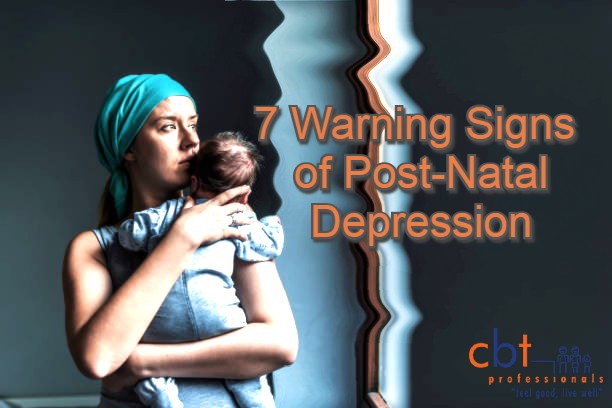7 Warning Signs of Postnatal Depression
Conception, pregnancy and the post-natal period can be such a rollercoaster of emotions and experiences for many women and their partners. This can include everything from difficulties conceiving to high risk pregnancies to traumatic births and difficult breastfeeding journeys and everything in between. All these combined with the transformative and often unexpected journey of parenthood for the first time, or learning to juggle two or more children; feeling unsupported and alone; having a history of depression or anxiety; hormone changes; and many other factors can trigger ante- or post-natal depression.
Too often, the people around us give expectant parents well-meaning advice, but cannot truly convey the enormity of what parenthood really entails. Many people understandably focus on the birth itself, and think very little past that momentous day. I have seen so many expectant parents preparing themselves for birth and getting their nursery Instagram-ready, but failing to plan for those trying weeks and months post-birth. Most people require significant emotional support and grace during this period, and yet, many people are isolated and unsupported, or even criticised and belittled for feeling the way they do, particularly after experiencing a traumatic birth. Some women do not feel that instant connection that is ‘indescribable and beautiful’ according to those who do experience it. You can probably see how these factors described combined with unrealistic expectations of ourselves can make this new chapter in our lives more difficult and overwhelming than it needs to be.
One in seven women can experience post-natal depression which typically occurs between one month and one year post-birth; however, you can start to have signs from a few days post-birth. For partners, this figure is slightly lower with one in ten experiencing post-natal depression between the first trimester and one year post-birth. The much expected ‘baby blues’ (which typically occur on day 3 – 4 post-birth and continue for a few days to a week) is perfectly normal and expected, and happens to the majority of new mothers. It usually consists of feeling moody, teary and anxious, but resolves with adequate support and understanding. If you find these symptoms, and the following seven warning signs of post-natal depression, persist for more than a couple weeks, you may have post-natal depression.
7 Warning Signs of Post-Natal Depression
- You feel like your mood is very low, and often for no explicable reason. This can feel as though you are exhausted, empty, sad and teary most of the time, on most days, and unable to feel much joy or happiness, e.g. finding it difficult to enjoy those fleeting moments with your child.
- You feel anxious, panicky, overwhelmed or excessively scared of being alone or going out without help, and find it does not get easier with practice or experience.
- You have trouble sleeping, are sleeping too long, or having nightmares (outside of what is expected during a time of chronic sleep deprivation).
- You feel like a failure, regretful, resentful or inadequate as a parent.
- You feel hopeless about the future as though things will never get better, or you may feel guilty, ashamed or worthless and question every single decision you make.
- You find yourself worrying excessively about your baby, often to the point of not being able to sleep, e.g. googling everything that could be wrong with your baby when they are unsettled or constantly asking your ‘mother’s group’ for advice and doubting your abilities.
- You may have dark thoughts where you feel as though your child or children would be better off without you.
You can access support from a variety of professionals, as well as utilising helplines like PANDA, Beyond Blue, or Parentline. You can get a referral from your General Practitioner to see a psychologist under a Mental Health Care Plan which allows individuals to access ten psychological sessions a year with a rebate from Medicare. These professionals and services can help new parents (or second-time plus parents) to gain strategies to cope with the stressors of parenthood, to assess whether what you are experiencing is post-natal depression, or a stress response to the demands of parenthood, and to support you during such a big life transition.
If you are struggling with any of the 7 warning signs of post-natal depression, please do not suffer in silence, and know that it is not your fault for developing post-natal depression. We have several Psychologists at CBT Professionals who are experienced in providing psychological support to people experiencing post-natal depression, many of whom are parents themselves and can empathise with the incredible toll it can take physically, emotionally, and psychologically. If you wish to speak to a CBT Professionals psychologist, download our Referral Form here and take it with you to your long consulation with your GP.
Disclaimer: Content on this website is provided for education and information purposes only and is not intended to replace advise from your doctor or registered health professional. Readers are urged to consult their registered practitioner for diagnosis and treatment for their medical concerns.
THREE CONVENIENT LOCATIONS
MOUNT GRAVATT
Mt Gravatt Medical PrecinctSE 105, 1808 Logan Rd
Upper Mount Gravatt QLD 4122


